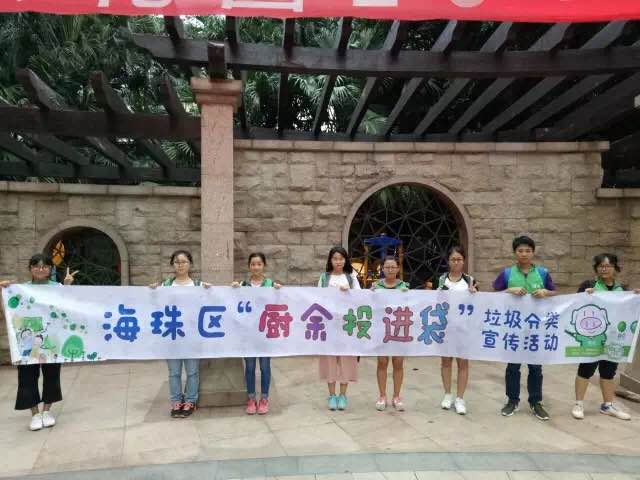There are a group of people at GDUFS who do their best to protect the environment around us, and let people realize the meaning of environmental protection and the meaning of ‘green’. They are members of the Green Pioneers Environmental Protection Association (GPEPA): they are the green guardians. We invited the two deputy directors of the organization, CHEN Fang and LIAO Minzhi, to share their views with us.

Members of GPEPA
The GPEPA has many projects such as collecting old clothes and giving them to the poor people; collecting dead batteries and sending them to recycling companies, and so on. Founded in 1996, they have done so many projects that have remarkably improved the environment around us over the two decades.
But not everything is going well.
To begin with, they don’t have enough storage to store the clothes collected through the old clothes collection project. Though this problem is hard to cope with, they managed to solve some problems by doing extra hours of work. The bigger problem is, however, many people haven’t realized the importance of environmental protection. They don’t understand why GPEPA are doing these projects. LIAO, who is also a member of the collection department, told us that when she showed up at the dormitory door to collect old clothes, some students didn’t seem to trust her and refused to give them old clothes. There are also people littering into the dead batteries collection box, so every time they collect batteries, they need to sort out the garbage first. But this problem hasn’t decreased their enthusiasm about environmental protection; they just hope that people can realize the importance of it and do what they can do.

Vegetarian food in the World Cuisine Corridor
They also took part in a program which brings scientific and literacy knowledge and offers medical services to rural areas. They went to Jieyang, a city in Guangdong Province, in two groups: one for investigating and the other for teaching students about environmental protection, as well as other routine subjects.
Recalling that period, CHEN Fang, who was once a part of the teaching group, beamed unconsciously. She said that students there were lovely and active. They would lock their arms in the teachers’, expecting their participation in the games, which could still arouse her excitement, even though it was so long ago. At night, they loved to go for a walk with the teachers ꟷ chatting and laughing, unwilling to let them go. They taught them knowledge, went hiking with them and held the fun sports meeting for them. Time went fast, and the farewell treated her badly.
The investigation group was also very hard. Being in charge of sending questionnaires to collect information, they had to knock door to door. Being given the cold-shoulder was mortifying and disappointing, but it happened all the time. In addition, in order to add the accuracy and variety of the information, members of the group walked three miles to another village, which was laborious, but turned out to be worthwhile.

Garbage classification activity
As hard as their work is, neither the leaders nor the members have regretted being part of the group. When asked about their understandings of voluntary work, CHEN said: Only when you are all in can you find the meaning of it. Also, LIAO expressed that voluntary work should be empowered by inner desires, because only in this way can a volunteer enjoy the happiness through serving and helping other people.
Their passion for environmental protection and voluntary work impressed us profoundly. They are trying their best, using all of their strength to appeal for an environmental-friendly lifestyle. They provided vegetarian food on the World Cuisine Corridor during the World Culture Festival. They advocate garbage classification. And their new programs, DIY bottles and planet adoption, are on the way.
Environmental protection is key, and it shouldn’t only be their business: we should shoulder our own responsibilities. Next time when you see their program, try to be a part, try to do something for where we live.

